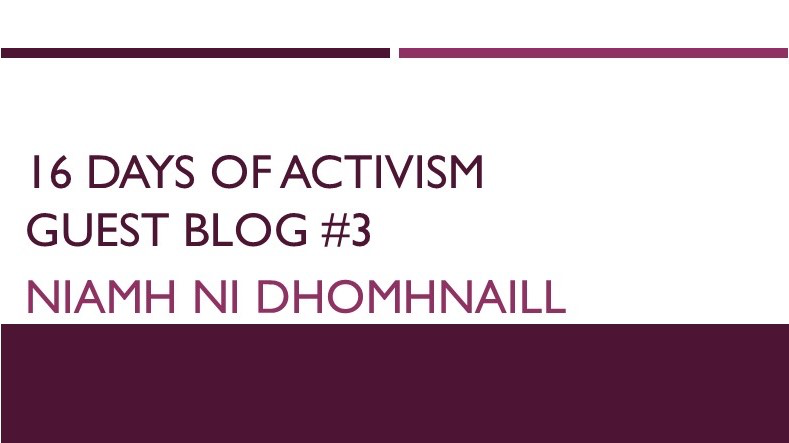#16DaysofActivism – Guest Blog – Niamh Ní Dhomhnaill
30 November 2017

Have you ever felt a pair of eyes own you? Of course you have- we all know that feeling. Sometimes I have known the name of those eyes holding me in a vice-like grip; the eyes of an acquaintance or colleague, and sometimes they have been a nameless set of eyes. The feeling is largely the same: that unique sense of being both painfully conspicuous and wholly invisible; devalued and devoid of a sense of self. In the moments after I feel like a fallow patch of land: left for now and returned to later, maybe- if I am deemed worthy. All of this is enacted on me, I am without say or agency. And what do I do? I turn my music up louder. I close my eyes and breathe deeply. I walk into work and say hello to my colleagues, as if nothing has happened, because realistically, if any of us were to acknowledge every incident as it happened we would feel that it was all we spoke about. And we know that to speak about it leaves us open to the comments of ‘lightening up’ – so why bother? Even in choosing to name our experiences (or not), we are stranded in that limbo of in/visibility: left with that heavy sense these interactions leave us with, whilst having our feelings invalidated.
The #MeToo campaign has changed this all of a sudden. Our social media feeds and lunchtime conversations are filled with the familiar drudgery of being sexualised without any agency. What was once said in hushed tones is now proclaimed in a clear, distinct voice. This isn’t without its own complications, and it has also brought about a deluge of sadness, anger, and reliving some of the more difficult moments we have experienced. For many of us, we are again without agency, being forced to think about situations that burned our cheeks and stung our eyes.
I am twenty-four and in my second year teaching: “It won’t last”, I am told in work when I say a teenage boy is constantly harassing me, and making sexual remarks in front of classes. “I’m worried about how he treats his peers if he treats me like this so publicly”, I say, hoping that the wellbeing of our students would at least be taken seriously, if not my own sense of dignity. The tilted head, the well-meaning, but inept response I endure from a senior female colleague: “You’re young and attractive—what do you expect? It won’t last, believe me, when you get to my age you will miss it.” The smile meant to placate me and politely end the conversation leaves me frustrated and confused.
And so it is that I have so little control that one pair of eyes can leave me feeling like I don’t own my own body, that I am not worthy of the space that my limbs occupy. But when did this start? When did I begin to apologise to others, and scold myself for the room that I occupied on buses, in the street, or in my own bedroom?
As a teenager I am taught, by whom exactly, I don’t know, that your worth isn’t your own: it is foisted upon you by a fast, silent car coming up behind, and it can be taken away just as fast- just as unexpected. Those beeps on the way home from school- the ones friends asked ‘How many did you get walking home yesterday?’ never made me feel proud, but I couldn’t discern why it was that I felt so uncomfortable- why a fourteen year old girl, walking home from school in her uniform, would feel uncomfortable hearing beeps from passing cars of grown men. Now I know. Those eyes: those all-seeing, unknown eyes, taking in, and feeding off my discomfort. I am older now, it still happens, albeit less frequently, and I still believe that colleague was wrong; when it stops, I won’t miss it, I will be weary, but relieved.
Support the DRCC today! Every Euro donated helps create a better, safer society in Ireland.
Please remember if you have been affected by sexual abuse you can call our National 24-Hour Helpline 1800 77 8888